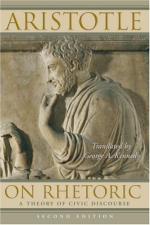
|
| Name: _________________________ | Period: ___________________ |
This quiz consists of 5 multiple choice and 5 short answer questions through Book I, Chapters 10-15.
Multiple Choice Questions
1. What was included in the special laws referenced by Aristotle?
(a) All of the explicit statutes of a political body.
(b) Some of the explicit statutes of a political body.
(c) All of the logical opinions of a political body.
(d) Some of the logical opinions of a political body.
2. In comparison to the other appeals, how much did Aristotle think that rhetoric resembled the dialectic in the logical appeal?
(a) Rhetoric resembled dialectic the same in the logical appeal.
(b) Rhetoric resembled dialectic the least in the logical appeal.
(c) Rhetoric most closely resembled dialectic in the logical appeal.
(d) Rhetoric resembled dialectic exactly in the logical appeal.
3. When did Aristotle think "what is good" made one happy?
(a) Occasionally.
(b) Most of the time.
(c) Always.
(d) Never.
4. What knowledge did Aristotle think was required by political rhetoric?
(a) At least two forms of government.
(b) Various forms of government.
(c) At least one form of government.
(d) The most effective forms of government.
5. As Aristotle explained, in which situations would rhetoric be useful?
(a) Situations where dialectic would also be appropriate.
(b) Situations where dialectic would be misunderstood.
(c) Situations where dialectic would be inappropriate.
(d) Situations where dialectic would be understood.
Short Answer Questions
1. As explained in Book I, Chapter 3, which type of rhetoric attempted to convince a legislature to take a particular action?
2. According to Aristotle, what was the most basic cause of pleasure?
3. Why did Aristotle think the universal law was higher than the special law?
4. How did Aristotle think a political orator should convince an audience of their plan?
5. According to Aristotle's explanation, how would a speaker approach a subject when using the logical appeal?
|
This section contains 361 words (approx. 2 pages at 300 words per page) |

|




